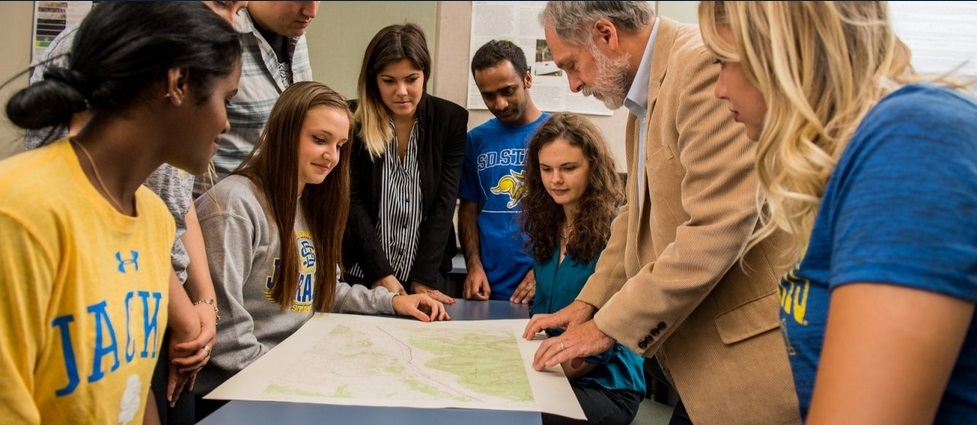| |
| |
Feb 10, 2026
|
|
|
|
|
2024-2025 Undergraduate Catalog [Archived Catalog]
Geography (B.A./B.S.)
|
|

 

Program Coordinator/Contact
Bob Watrel, Department Head
Department of Geography and Geospatial Sciences
109 Wecota Hall
605-688-4511
Program Information
Geography is the scientific study of the distribution of both physical and human features of the Earth’s surface. Geographers seek to describe, relate and explain the natural and cultural phenomena that distinguish places around the world. Geographers focus upon “where” and “why” questions concerning the global environment. Geography also functions as a bridge between the natural sciences; its perspective on the location of phenomena makes it unique among the academic disciplines. The process of change is a fundamental theme in geography and the examination of how humankind modifies the Earth is a continual emphasis. The study of geography is thus of vital concern to all citizens and provides graduates with numerous career opportunities in business, education, and government.
The Geography program is designed to provide the student with a general education as well as a concentration in the major field of study. The faculty recommends that majors take several courses in disciplines closely related to their specific area of interest in geography. Those interested in physical geography might register for associated courses in physics, agricultural sciences, botany or other allied disciplines. If one is interested in human geography, course work in sociology, economics, history, political science or foreign language or some other social science might be considered. For technical geography, computer science and mathematics courses are recommended. Qualified students may also enhance their academic experience with participation in the Undergraduate Scholars Program.
Program Emphases
- The Planning Emphasis stresses research techniques and is oriented toward future employment in governmental, industrial, military, or planning positions.
- The Environmental Planning and Management Emphasis is designed to prepare students for careers in governmental, industrial, managerial, recreational areas, and commercial corporations.
Course Delivery Format
Geography is not only a classroom subject but one that also includes laboratory research, fieldwork, and travel, as well as limited online coursework.
|
Academic Requirements
Students must complete a minimum of 18 upper division credits in major courses and earn at least a “C” in each course used to meet the major requirements. Requirements for Geography Major: 120 Credits
Bachelor of Arts
Bachelor of Science System General Education Requirements
- Goal #1 Written Communication: SGR #1 Electives Credits: 6
- Goal #2 Oral Communication:
- Goal #3 Social Sciences:
- Goal #4 Arts and Humanities:
- Goal #5 Mathematics:
- Goal #6 Natural Sciences:
Department of Geography and Geospatial Sciences Requirements
- One declared minor outside of the major prefix OR a second major OR a teaching specialization. The minor may be a traditional minor within one department or it may be interdisciplinary involving more than one department. The minor can be in a different college. The minor must be declared no later than the student’s third semester of enrollment.
- Capstone course in the major discipline
- Upper division coursework Credits: 30
Bachelor of Arts Requirements: 6+ - Modern Foreign Language Including the 202-Level Credits: 6+
Bachelor of Science Requirements: 10+ - Natural Sciences Credits: 10+
- Any two lab sciences.
- Coursework must include 2 prefixes.
- MATH and STAT courses do not count toward the science requirement.
Major Requirements - Bachelor of Arts
Regional Geography
Select six credits (one GEOG and one other prefix) from the following. Credits: 6 Select from the following
Select twelve credits from the following three categories - Political and Cultural Geography, Economic Geography and Social Geography, and Environmental Geography. Select two of the categories and complete one GEOG and one other discipline in each of the two chosen categories. Credits: 12 Political and Cultural Geography
Economic Geography and Social Geography
Major Requirements - Bachelor of Science
Advanced Physical Geography and Human-Earth Relationships
Select three credits from the following courses. Credits: 3 Regional Geography and Advanced Human Geography
Select three credits from the following courses. Credits 3 Electives
Taken as needed to complete any additional degree requirements. Total Required Credits: 120
Summary of Program Requirements
Bachelor of Arts | | System General Education Requirements* | 30 Credit Hours | | Department of Geography and Geospatial Sciences Requirements** | 6+ Credit Hours | | Major Requirements | 41 Credit Hours | | Electives** | 43 Credit Hours | Bachelor of Science | | | System General Education Requirements* | 30 Credit Hours | | Department of Geography and Geospatial Sciences Requirements** | 10+ Credit Hours | | Major Requirements | 41 Credit Hours | | Electives*** | 47 Credit Hours | *System General Education Requirements for students pursuing a baccalaureate degree shall include a minimum of 30 credit hours. Some general education coursework may be counted for Major Requirements, Supporting Coursework, and Department Requirements.
**System General Education Requirements, Major Requirements, and Supporting Coursework may satisfy some or all of the above requirements.
***Taken as needed to complete any additional degree requirements. Academic Advising Guide Sheet
The goal of the academic advising guide sheets and sample plans of study is to promote undergraduate student success by guiding all students to timely completion of an undergraduate degree. Students are not limited to the course sequence provided for their academic program. Instead, the sample plan of study is one possible path to completing your degree and is meant to be used as a guide for planning purposes in consultation with an academic advisor. The plans also help students prepare for meetings with their academic advisor and track their progress in their selected academic program. |
|
|
|